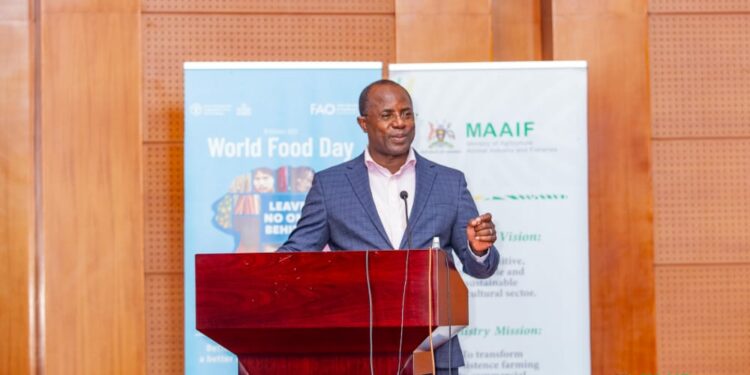The government of Uganda has instituted a series of measures to curtail climate change and its devastating impacts, that are taking a heavy toll on food security for several households.
These measures were contained in a keynote speech delivered by the state Minister for Agriculture, Animal Industry and Fisheries (MAAIF) Hon. Maj. (Rtd) Kyakulaga Fred Bwino on how prepared the government is in handling climate change impacts and the emerging food insecurity in Uganda.
His Keynote speech was part of a series of activities that were embodied in the World Food Day dialogue which took place at the Office of the Prime Minister (OPM) on October 13th, ahead of the commemoration of World Food Day 2022, which will take place on October 16th at National Crops Resources Research Institute (NaCRRI) in Namulonge, Wakiso district.
The dialogue was an embodiment of several impressive speeches by distinguished Panelists like the second Deputy Prime Minister Rt. Hon. Rukia Nakadama, Deputy Executive Director for NARO Ronald Baguma, country head for Food and Agricultural Organization (FAO) Antonio Querido and Agnes Kirabo, the Execitive Director of Food Rights Alliance (FRA) who stressed the need to create engagement opportunities for farmers at local levels vital for mindset change and a favourable legal policy that is in harmony with several initiatives intended to boost small holder farmers.
Ms. Kirabo advocated for a policy framework that obliterates bottlenecks in the food supply chains, hence defusing market-based challenges for small holder farmers, which in turn increases agricultural productivity.
The celebrations at Namulonge will be held under the theme “Leave no one behind, Better production, Better Nutrition, Better Environment and Better life”
It is important to assert that climate change breeds a phenomenon of global warming which is among the global shocks, that are majory perpetuated by the burning of greenhouse gases like carbondioxide in the atmosphere as a result of industrialization, resulting into the greenhouse effect.
Relatedly, other human activities like lumbering and intense farming have led to relentless encroachment on catchment areas like swamps and this has negatively impacted the rainfall formation cycle, leading to prolonged periods of drought.
The combination of all these have put Uganda on the verge of disaster as far as food security is concerned.
Dr. Steven Mpade, the director for Moroto regional referral hospital in an intervew with the Weekly Obsever in July this year, said that a total of 200 children perish in Karamoja Sub-region every year as a result of malnutrition and biting poverty.
Hon. Fred Bwino clearly pointed out that it is an excruciating task to predict weather shifts and parterns and this has complicated agricultural practices. He said that the impacts of climate change have been manifesting mainly in form of unpredictable weather patterns, leading to prolonged periods of drought.
“Previously, we used to know when rain would come, we used to know when rain would stop, but as we talk, on top of having prolonged drought, we are not able to know when rain would come, we cannot predict it. Therefore, its not easy to plan for agriculture activities moreso in a country where we are mainly depending on rain fed agriculture,” Minister Bwino revealed.
Adding yeast to the already fermented bread, when the rains fall, they do so abnormally, with snow, extremely strong winds something which produce perilous effects like floods, leading to terrible loss of lives and wanton destruction of property, including crops.
“We have seen frequent and very severe instances of floods, you remember what happened recently in areas of Bugisu in Mbale where alot of property was lost, a lot of life was lost”
Worse still, these changes come along with high incidents of diseases for both crops and animals as well as disease vectors leading to food, animal feed and nutrition insecurity, with 30% of the population on the verge of sturvation according to Minister Bwino.
With that note therefore, the retired army major said government believes enough is enough and that climate change has to be aggressively dealt with. He said the state took a firm decision of restoring the environment by instituting a sub-committee chaired by the First Deputy Prime Minister Rt. Hon. Rebecca Kadaga, which made research about the phenomenon and recommended yet to be unveiled measures that will work to restore the environment.
“In a few weeks, his excellency the president will come up to announce the measures to restore the environment”
The second intervention according to Minister Bwino is to tackle the destruction of wetlands in form of growing rice and other activities. He said government has taken a bold decision to stop any kind of growing rice in swamps and other activities, on top of seriously dealing with transgressors.
He also announced efforts by government to build resilience capacity among several agricultural stakeholders such that farmers stop depending on rain for agriculture. These include; the introduction of drought resistant crop varieties, introduction of water pumps to foster irrigation among others.
Also as a drastic measure aimed at addressing food insecurity, Hon. Bwino revealed that government has undertaken significant strides to see to it that farmers embrace agricultural mechanization as a way of increasing productivity.
Climate change in Uganda has bred divastating impacts on food security in several regions of the country due to unpredictable weather patterns leading to prolonged periods of drought and destructive rains which have complicated farming activities.
Do you have a story in your community or an opinion to share with us: Email us at editorial@watchdoguganda.com













